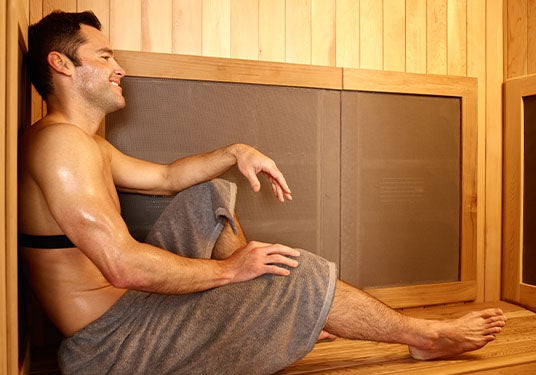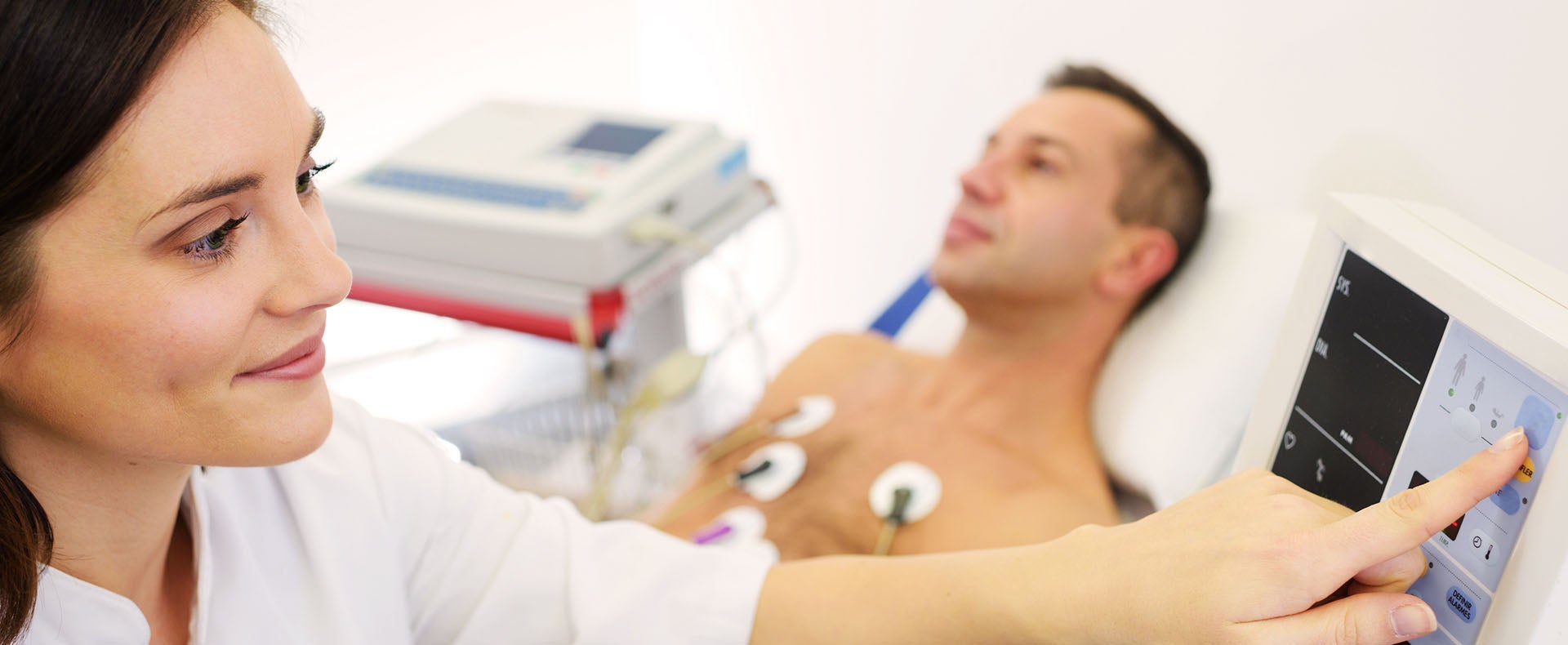The Foundational Infrared Sauna Studies in Japan
Though infrared sauna is considered a fairly new modality as it has gained popularity in recent years, there is more than 30 years research on infrared and heart health, beginning with waon therapy in Japan. Waon therapy with infrared sauna is the accepted, standard therapy for heart disease in Japan because it is shown to improve the function of the cells that line the arteries and their blood flow.1
In 1989, a 76-year-old patient with severe heart failure inspired his cardiologist, Dr. Chuwa Tei, to pursue what was then termed “thermal therapy.” While at his post at the Kirishima Rehabilitation Center, Kagoshima University School of Medicine, Dr. Tei developed the protocol for what eventually became renamed “waon therapy,” meaning “soothing warmth.”

Waon therapy involves 15 minutes in a far infrared sauna at 60°C/140°F, followed by 30 minutes wrapped in a warm blanket. Over the course of 10 or 15 years, continued research showed that blood pressure responded; congestive heart failure responded; artery measures showed improvement. The therapy increases the patient’s body temperature 1°C/2°F and improves vascular function in the entire body.
- Improves artery health, strengthens endothelial cells that line the walls of arteries
- Dilates arteries and veins to decrease vascular resistance
- Increases circulation and blood flow by reducing cardiac preload and afterload, resulting in an increase of stroke volume and cardiac output
- Decreases cytokines, histamines, and other inflammatory cells in blood stream
- Improves exercise ability: after treatments with waon therapy, people demonstrate a greater ability to walk, whether limited by heart or leg vascular issues
- Intensifies the production of nitric monoxide (NO), which is closely related to these actions, and heat shock protein, which is a kind of stress induced protein that exercises a biological defense mechanism
This means that waon therapy has anti-atherogenic action, increasing systematic blood flow and thus supplying necessary nutrition—oxygen—to each of the organs’ cells. This is why waon therapy applies clinically in broad ways and demonstrates remarkable effects on alleviating and preventing many types of diseases that are hard to control.
The research has shown that waon therapy may even save lives: in a study of 129 patients with bad heart problems, patients treated with infrared therapy at least two times a week were compared to similar patients who did not get the soothing warmth therapy. Over five years, the rate of hospitalization and death was cut in half in the waon treated patients compared to the others.
Early in the 2000s, waon therapy caught the attention of U.S. cardiologist Dr. Joel Kahn in his ongoing research to find ways to help his patients as much as possible. When he came across this research from Japan, he began incorporating it into his practice since, and recommends infrared sauna for his patients at the Kahn Center for Cardiac Longevity in Bingham Farms, Michigan, one of the world's premier cardiac clinics. More and more cardiologists have begun to incorporate infrared sauna as a treatment option. In Arizona at another premier clinic, Dr. Jack Wolfson advocates the use of infrared sauna in his goal to help patients achieve a “100-Year Heart,” that will be strong and healthy for an active life of longevity. At the Gladden Wellness Institute in Dallas, Texas, Dr. Gladden incorporates infrared sauna in any protocols to help support health and well-being.
Regular Sauna Use and Heart Health
Cell biologist and public health educator Dr. Rhonda Patrick has published a review2 of the benefits of general sauna use. A number of several studies have shown that frequent sauna bathing in general (4-7 times per week) is associated with:
- 50% lower risk for fatal heart disease
- 60% lower risk for sudden cardiac death
- 51% lower risk for stroke
- 46% lower risk for hypertension
- Just a single sauna session has been shown to lower blood pressure, improve heart rate variability, and improve arterial compliance

She explains some of the reasons sauna is so beneficial to the cardiovascular system and whole-body health include:
- Similar physiological changes that also occur during physical exercise
- 50-70% redistribution of blood flow away from the core to the skin to facilitate sweating
- Heart rate increases up to 150 beats per minute (like moderate-intensity physical exercise)
- Cardiac output (which is a measure of the amount of work the heart performs in response to the body’s need for oxygen) increases by 60-70%
- Immediately after sauna use, blood pressure and resting heart rate are lower than baseline, similar to physical activity
A 2018 review published in the journal, Evidence Based Complementary Alternative Medicine, found 40 clinical studies involving nearly 4,000 participants that met their criteria, and the overall conclusion was that sauna has potential effects.3
Recent and important studies out of Finland showing a relationship between frequent sauna use and a reduction in cardiovascular disease and memory loss:
2015 Reduced All-Cause Mortality Study
This famous study is quoted by many experts for its significant findings with a large number of participants over a long period of time. The study followed 2,315 middle aged men for a median of 20.5 years. The researchers concluded that increased frequency of sauna bathing is associated with a reduced risk of sudden cardiac death, fatal coronary heart disease, fatal cardiovascular disease, and all-cause mortality.4
2018 Stroke Study
This study followed 1,500 men and women (50-70 years old) for 15 years who never had a stroke. Participants who saunaed 4 to 7 times per week had 61% lower risk of stroke.5
2018 Cardio Fitness Study
This study concluded that sauna use appears to be as good as exercise for keeping cardio system healthy. The study followed 2,266 men over 26 years, and showed both cardiorespiratory fitness and regular sauna use were associated with a lower rate of total cardiovascular events. Frequent sauna users had 40% fewer cardio events and death than those with rare sauna use. Those with high levels of cardiorespiratory fitness had 50% less events than those with low fitness. And those with high fitness and frequent sauna use had 60% less cardiovascular events than those with low fitness and sauna use.
This study advocates the benefit and importance of combining a regular exercise program with sauna use.6
2017 Hypertension Study
This study followed 1,600 men (age 42-60) for 24 years. It found a reduced risk of hypertension associated with regular sauna bathing, which may be a mechanism underlying the decreased cardiovascular risk associated with sauna use. Those who saunaed 4 to 7 times a week cut their risk of high blood pressure by nearly 50%, compared to once-a-week sauna bathers.7
Other Key Studies of Sauna and Cardiovascular Health

The Blood Pressure Study / A Study of the Health Benefits of Far Infrared Sauna Therapy,
UMKC (2005). This clinical study found that far infrared heat temporarily lowers both systolic and diastolic blood pressure. This is the only study done on infrared sauna technology on the market vs in a controlled medical environment. Read study.
Do Far-infrared Saunas Have Cardiovascular Benefits in People with Type 2 Diabetes?, Canadian Journal of Diabetes (2010). A clinical study over three months found cardiovascular improvements and reduced waist circumference in people with type 2 diabetes with regular infrared sauna use. Read study.
Waon therapy improves quality of life as well as cardiac function and exercise capacity in patients with chronic heart failure, PubMed® (2015). Study of 49 patients with chronic heart failure who received far infrared sauna and waon therapy daily for 3 weeks showed improvements in mental health, exercise ability, and improved cardiac function. Read study.
Repeated thermal therapy improves impaired vascular endothelial function in patients with coronary risk factors, Journal of the American College of Cardiology (2001). Study of 25 patients with at least one cardiac issue were compared with a control group of 10 with no cardiac issues. Participants received waon therapy once a day for 2 weeks. The study concluded that repeated sauna treatment improves impaired vascular endothelial function in the setting of coronary risk factors, suggesting a therapeutic role for sauna treatment in patients with risk factors for atherosclerosis. Read study.
Waon Therapy for Managing Chronic Heart Failure Results from a Multicenter Prospective, Randomized WAON-CHF Study, Circulation Journal (2016). In Japan, 19 institutes participated in a 10-day study of severe heart failure patients. The patients were given waon therapy once a day for 10 days and compared with a control group of healthy patients. The study found that waon therapy with infrared sauna showed clinical advantages in safety and efficacy among patients with advanced heart failure. Read study.
Effect of post-exercise sauna bathing on the endurance performance of competitive male runners, Journal of Science and Medicine in Sport (2007). To investigate the idea that physiological adaptations to sauna bathing could enhance endurance performance, researchers performed a cross-over study of six, male, distance runners, using 3 weeks of post-training sauna bathing and 3 weeks of control training. They found the sauna produced a worthwhile enhancement of endurance running performance, probably by increasing blood volume. Read study.
Potential mechanisms for the effects of far-infrared on the cardiovascular system - a review, Vasa (2019). This informative review explores the current understanding of the cellular and molecular mechanisms involved in far infrared and its impact on the cardiovascular system based on a comprehensive survey of all literature available. Read study.
Editor’s Note: People with heart disease should first consult their own physician before using sauna therapy due to the uniqueness of individual cases.



